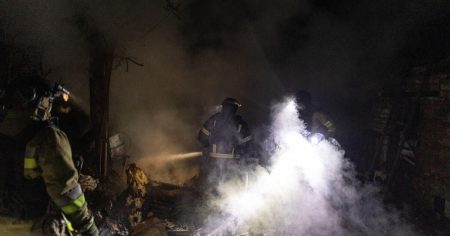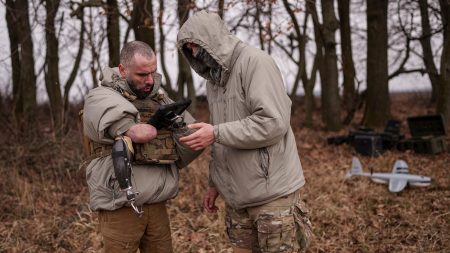Hamas Set to Release Four Hostages as Ceasefire Agreement Advances
In a poignant step toward de-escalation, Hamas is expected to release the bodies of four hostages to Israel on Thursday, marking the first phase of a fragile ceasefire agreement between the two sides. Among those set to be returned are members of the Bibas family, including Shiri Bibas and her two children, Ariel and Kfir Bibas, as well as Oded Lifshitz, a journalist and peace activist. The release comes as part of a three-phase ceasefire deal aimed at bringing a measure of peace to the region after months of devastating conflict.
Israeli officials have confirmed the identities of the four individuals, and upon their return, forensic analysis will be conducted to confirm the bodies. This step is crucial for the families of the hostages, who have endured unimaginable pain and uncertainty since the abduction of their loved ones. The release is also seen as a critical confidence-building measure in the broader ceasefire agreement, which has brought a measure of hope to a region torn apart by violence.
The Bibas Family: A Heartbreaking Loss
The Bibas family’s story is one of immense tragedy and resilience. Shiri Bibas, along with her children Ariel and Kfir, were among the 251 hostages taken by Hamas on October 7, 2023, during one of the most devastating terror attacks in Israel’s history. Kfir, just 8.5 months old at the time of his abduction, is the youngest of the hostages. The family’s ordeal has captivated the hearts of people around the world, symbolizing the human cost of the conflict.
The news of their deaths has sent shockwaves through their community and beyond. The Hostages Family Forum, a group representing the families of those taken, described the loss as “heart-shattering,” noting that the pain of their absence is felt not only by their immediate family but by people worldwide. The release of their bodies brings some measure of closure, but the wound left by their loss will never fully heal.
A Grieving Nation and the Path to Peace
Israeli Prime Minister Benjamin Netanyahu has expressed his condolences to the grieving families, saying, “At this difficult time, our hearts go out to the grieving families.” His statement reflects the collective sorrow of a nation that has endured immense suffering. The Hostage Families Forum has called for the second phase of the ceasefire agreement to proceed without delay, emphasizing that “there is no time to waste.”
The ceasefire agreement, which is divided into three phases, aims to achieve a permanent cessation of hostilities. In the second phase, which is expected to last 42 days, Israel is to withdraw its forces from the Gaza Strip. This phase is critical, as it sets the stage for the release of all remaining hostages in exchange for Palestinian prisoners. The agreement also includes provisions for the return of displaced Palestinians to northern Gaza, a key demand by Hamas.
The Human Cost of the Conflict
The conflict has left an indelible mark on both Israelis and Palestinians. In Gaza, the humanitarian crisis continues to worsen, with over 48,000 Palestinians killed since the outbreak of war. The destruction is overwhelming, with entire neighborhoods reduced to rubble. Families like the Nijim family, who now live among the ruins of their home in Jabaliya, are a testament to the devastating impact of the war.
The release of the hostages is a step toward peace, but the road ahead is long and fraught with challenges. The emotional toll on the families of the hostages is immeasurable, and the scars of the conflict will take years to heal. The Hostage Families Forum has called for the international community to support the ceasefire agreement, emphasizing the need for urgent action to prevent further loss of life.
Looking Ahead: The Next Phases of the Ceasefire
While the first phase of the ceasefire has brought some measure of hope, the path to lasting peace remains uncertain. Negotiations for the second phase have yet to begin, but mediators, including Qatar, are pushing for talks to start as soon as possible. Hamas has accused Israel of delaying the process, but both sides have expressed a commitment to moving forward.
In the coming days, six more hostages are expected to be released, including Eliya Cohen, Tal Shoham, Omer Shem Tov, Omer Wenkrat, Hisham Al-Sayed, and Avera Mengistu. Additionally, four more bodies are set to be returned to Israel next week. These releases are a reminder of thefragility of the ceasefire and the need for both sides to uphold their commitments.
A Call to Action: Ensuring the Ceasefire Holds
As the ceasefire agreement moves forward, the international community must remain vigilant in its support for the process. The release of the hostages is a step in the right direction, but it is only the beginning. The next phases of the agreement will require difficult compromises and a commitment to peace from both Israel and Hamas.
The families of the hostages have called for the second phase of the ceasefire to proceed without delay, urging the international community to ensure that the agreement is upheld. Their plea is a reminder of the human cost of the conflict and the need for urgent action to prevent further suffering.
In the end, the release of the hostages is a bittersweet reminder of the fragility of peace in the region. While the ceasefire offers a glimmer of hope, the road to lasting peace will require courage, compromise, and a commitment to the human dignity of all those affected by the conflict.















